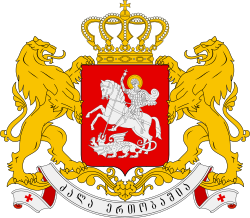14-16 February 1919 | |||||||||||||||||||||||||||||||||||||||||||||||
All 130 seats in the Constituent Assembly 66 seats needed for a majority | |||||||||||||||||||||||||||||||||||||||||||||||
|---|---|---|---|---|---|---|---|---|---|---|---|---|---|---|---|---|---|---|---|---|---|---|---|---|---|---|---|---|---|---|---|---|---|---|---|---|---|---|---|---|---|---|---|---|---|---|---|
| Registered | 876 910 | ||||||||||||||||||||||||||||||||||||||||||||||
| Turnout | 57.64% | ||||||||||||||||||||||||||||||||||||||||||||||
| |||||||||||||||||||||||||||||||||||||||||||||||
| |||||||||||||||||||||||||||||||||||||||||||||||
 |
|---|
Constituent Assembly elections were held in the Democratic Republic of Georgia between 14 and 16 February 1919. [1] The electoral system used was party-list proportional representation using the D'Hondt method in a single nationwide district. [2] The result was a victory for the Social Democratic Labour Party of Georgia, which won 81% of the vote, and 109 of the 130 seats. In by-elections held in spring, they lost four seats and the Armenian Party in Georgia–Dashnaktsitiuni and the Georgian National Party both won seats. [3]
Following the election, the Constituent Assembly approved and ratified the Act of Independence on 12 March. [4]



